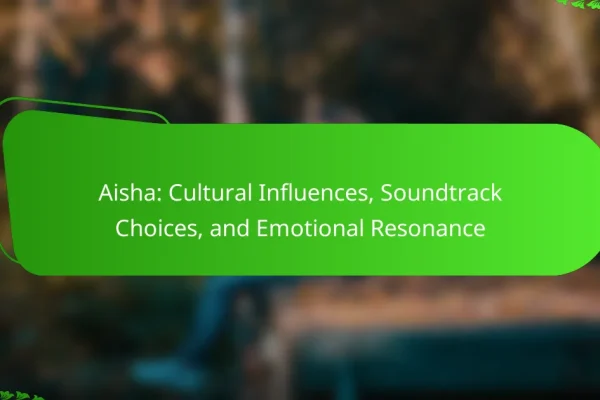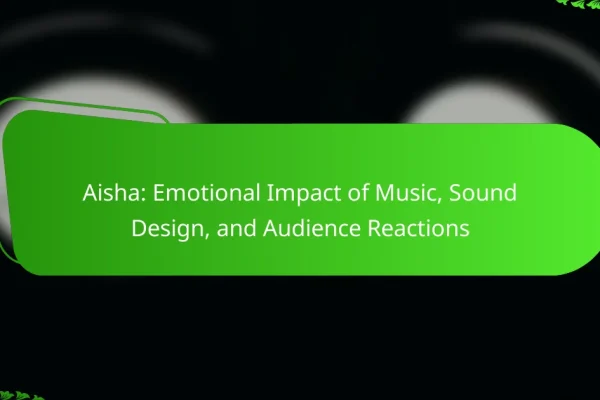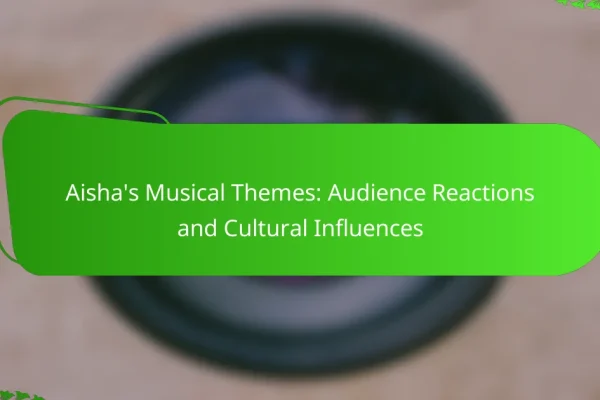How does the soundtrack enhance Aisha’s narrative?
The soundtrack of Aisha plays a crucial role in enhancing the narrative by creating an emotional landscape that resonates with the characters’ journeys. Music underscores key moments, amplifying the emotional weight and helping to convey themes that might otherwise be lost in dialogue alone.
Emotional depth through music
Music in Aisha serves to deepen the emotional experience for the audience. For instance, poignant melodies accompany scenes of conflict or resolution, allowing viewers to feel the characters’ struggles and triumphs more intensely. This use of sound can evoke a range of emotions, from joy to sorrow, making the narrative more impactful.
Additionally, the choice of musical styles reflects the cultural context of the story, enhancing authenticity. Traditional instruments or contemporary sounds can set the mood, drawing the audience into Aisha’s world and making the emotional experiences more relatable.
Character development via themes
The soundtrack also plays a significant role in character development through recurring musical themes. Each character may have a distinct motif that evolves alongside their journey, signaling growth or change. For example, a character’s theme might start as a simple melody and become more complex as they face challenges, mirroring their development.
Moreover, these musical themes can create connections between characters, highlighting relationships and conflicts. When two characters share a musical motif, it can signify their bond or tension, enriching the storytelling and providing deeper insights into their dynamics.
What are the key songs featured in Aisha?
Aisha features a vibrant soundtrack that includes both original compositions and popular tracks. The music plays a crucial role in enhancing the film’s narrative and emotional depth.
Original compositions by A.R. Rahman
A.R. Rahman, a renowned composer, created original pieces for Aisha that blend contemporary sounds with traditional Indian music. His compositions are characterized by rich melodies and intricate arrangements, making them memorable highlights of the film.
Key songs such as “Ishq Shava” and “Dil Mera Muft Ka” showcase Rahman’s ability to fuse different musical styles, appealing to a broad audience. The use of varied instruments and vocal styles adds to the unique flavor of each track.
Popular tracks from the film
In addition to Rahman’s original compositions, Aisha features several popular tracks that resonate with viewers. Songs like “O Haseena Zulfon Wali” and “Shaam” have gained significant popularity, often being played on various music platforms.
These tracks not only contribute to the film’s atmosphere but also reflect the themes of romance and friendship. Their catchy tunes and relatable lyrics have made them favorites among fans, further solidifying the film’s musical legacy.
How does music influence audience perception in Aisha?
Music significantly shapes audience perception in Aisha by enhancing emotional responses and guiding viewer interpretations. The soundtrack complements scenes, creating a deeper connection between the audience and the narrative.
Setting the mood for scenes
The soundtrack in Aisha plays a crucial role in establishing the mood for various scenes. For instance, upbeat tracks may accompany joyful moments, while somber melodies can underscore dramatic or tense situations. This alignment of music with visual storytelling helps to evoke specific emotions from the audience.
Consider how a romantic scene might be enhanced by soft, melodic tunes, while a confrontation could be accompanied by intense, fast-paced music. The right choice of music can transform a scene’s impact, making it more memorable and engaging.
Impact on viewer engagement
Music in Aisha directly affects viewer engagement by drawing them into the story. A well-composed soundtrack can heighten anticipation and maintain interest, encouraging audiences to stay invested in the characters and plot. For example, recurring musical themes can create familiarity, making viewers more emotionally attached to the narrative.
However, mismatched music can detract from the viewing experience, leading to confusion or disengagement. Filmmakers should carefully select music that aligns with the emotional tone of each scene to ensure that the audience remains connected to the story throughout the film.
What role does A.R. Rahman play in Aisha’s music?
A.R. Rahman serves as the composer and music director for the film Aisha, significantly shaping its musical landscape. His unique sound and innovative approach bring a fresh energy to the film’s soundtrack, enhancing its narrative and emotional depth.
Composer and music director
A.R. Rahman is renowned for his ability to blend various musical styles, and in Aisha, he showcases his talent as both composer and music director. He crafts melodies that resonate with the film’s themes of love and self-discovery, creating an auditory experience that complements the visual storytelling. His involvement ensures that the music is not just an accompaniment but a vital part of the film’s identity.
The soundtrack features a mix of genres, including pop, classical, and Indian folk, reflecting the diverse influences that Rahman incorporates into his work. This eclectic mix appeals to a broad audience, making the music accessible while still maintaining artistic integrity.
Signature style and contributions
A.R. Rahman’s signature style is characterized by rich orchestration, innovative use of technology, and a deep understanding of rhythm and melody. In Aisha, he employs these elements to create memorable tracks that stand out, such as “Gal Mithi Mithi Bol,” which combines contemporary sounds with traditional Indian music. This fusion not only enhances the film’s appeal but also showcases Rahman’s versatility as a composer.
<pHis contributions extend beyond mere composition; Rahman often collaborates with lyricists and vocalists to ensure that the music aligns perfectly with the film's emotional tone. This collaborative approach results in songs that are not only catchy but also meaningful, resonating with the audience long after the film ends.
How is the music of Aisha received by critics?
The music of Aisha has generally been well-received by critics, praised for its innovative blend of genres and emotional depth. Reviewers highlight the soundtrack’s ability to enhance the film’s narrative and resonate with audiences.
Positive reviews from music critics
Many music critics commend Aisha’s soundtrack for its diverse range of styles, incorporating elements of pop, classical, and traditional music. The emotional resonance of the songs, particularly in key scenes, has been noted as a standout feature that elevates the overall cinematic experience.
Critics have also pointed out the strong performances by the vocalists, which add authenticity and depth to the music. The production quality is frequently highlighted, with some reviewers calling it a benchmark for soundtracks in contemporary cinema.
Chart performance and accolades
Aisha’s soundtrack has achieved notable success on various music charts, often appearing in the top positions for several weeks. The blend of catchy melodies and relatable lyrics has contributed to its popularity among listeners, leading to significant streaming numbers.
In addition to chart success, the soundtrack has received several accolades, including nominations for prestigious music awards. These recognitions reflect the critical acclaim and commercial appeal of the music, solidifying its place in the film’s legacy.
What are the themes explored in Aisha’s soundtrack?
Aisha’s soundtrack delves into themes of love, longing, identity, and culture, reflecting the emotional landscape of the characters and their journeys. The music serves as a narrative device, enhancing the storytelling by connecting the audience to the characters’ experiences and backgrounds.
Love and longing
The theme of love and longing is central to Aisha’s soundtrack, capturing the complexities of romantic relationships and unfulfilled desires. The melodies often evoke a sense of nostalgia, resonating with listeners who have experienced similar emotions.
Instrumental pieces paired with poignant lyrics illustrate the characters’ struggles with love, emphasizing moments of connection and separation. For instance, a slow ballad might accompany a scene of heartbreak, deepening the emotional impact.
Identity and culture
Aisha’s soundtrack also explores themes of identity and culture, reflecting the diverse backgrounds of its characters. The incorporation of traditional instruments and musical styles highlights cultural heritage, enriching the narrative with authenticity.
By blending contemporary sounds with cultural motifs, the music underscores the characters’ journeys of self-discovery. This fusion not only enhances the storytelling but also invites the audience to appreciate the richness of different cultural identities.
How does Aisha’s music compare to other films?
Aisha’s music stands out for its vibrant blend of contemporary and traditional elements, making it distinct from many other films. While it shares common traits with Bollywood soundtracks, it also incorporates unique stylistic choices that enhance its narrative and emotional depth.
Similarities with Bollywood soundtracks
Aisha’s soundtrack features catchy melodies and elaborate arrangements typical of Bollywood music. The use of diverse instruments, including strings and percussion, creates a rich auditory experience that resonates with fans of the genre. Additionally, the songs often serve as narrative devices, advancing the plot and deepening character development, a hallmark of traditional Bollywood films.
Moreover, the incorporation of romance and celebration themes in the music aligns with the emotional storytelling found in many Bollywood productions. This connection allows audiences to engage with the film on both a musical and emotional level.
Distinctive elements of Aisha’s score
Unlike many Bollywood soundtracks, Aisha’s score integrates modern pop influences, giving it a fresh and contemporary feel. The use of electronic elements alongside traditional sounds creates a unique soundscape that sets it apart from typical Bollywood offerings. This blend appeals to a wider audience, including younger viewers who may prefer modern music styles.
Additionally, Aisha’s music often features collaborations with various artists, further diversifying its sound. This approach not only enhances the film’s appeal but also reflects the multicultural influences present in the storyline, enriching the overall viewing experience.
What future trends can be seen in soundtracks like Aisha?
Future trends in soundtracks, such as those in Aisha, indicate a growing integration of technology and personalized music experiences. These trends reflect advancements in production techniques and listener engagement, shaping how soundtracks are created and consumed.
Integration of technology in music production
The integration of technology in music production is transforming how soundtracks are crafted. Digital audio workstations (DAWs) and software plugins allow composers to experiment with a wide range of sounds and effects, enhancing creativity and efficiency.
For instance, artificial intelligence is increasingly being used to analyze listener preferences and generate music that aligns with those tastes. This can lead to more tailored soundtracks that resonate with specific audiences, making the listening experience more engaging.
Moreover, advancements in virtual reality (VR) and augmented reality (AR) are opening new avenues for immersive sound experiences. Soundtracks can now be designed to interact with visual elements, creating a cohesive narrative that enhances the overall impact of the media.












